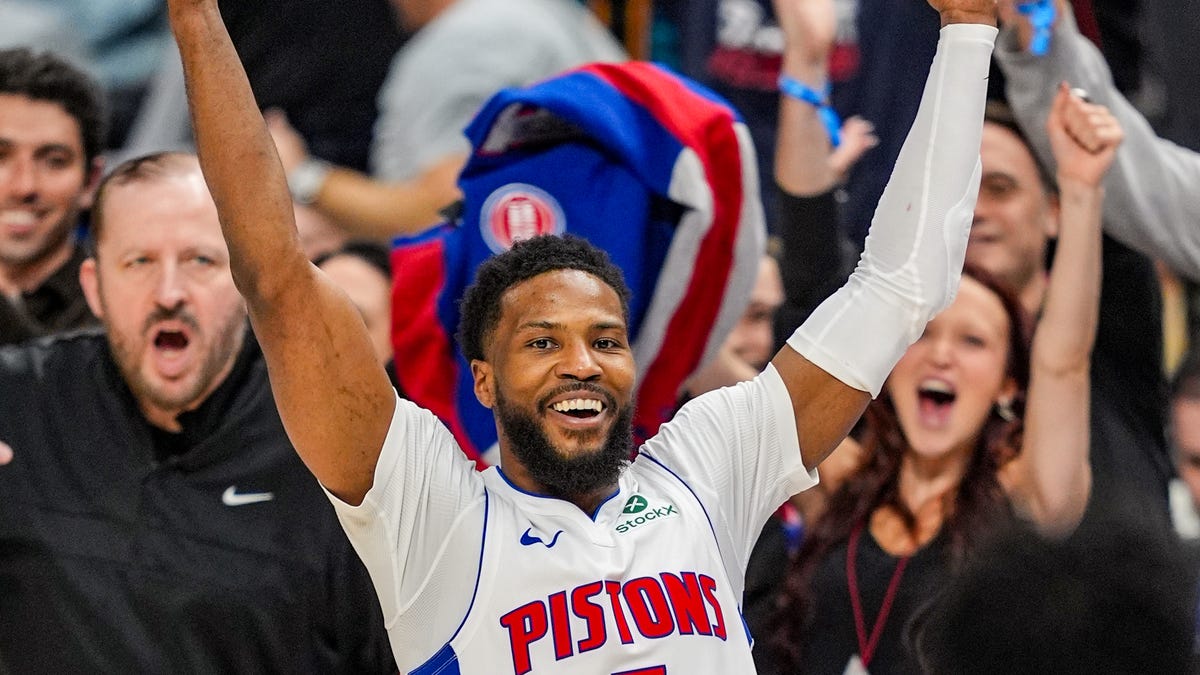Malik Beasley asked the Detroit Pistons not to trade him before February’s trade deadline. Beasley wanted to stay in Detroit — and still does.
“In my whole 9 years in the NBA, I never had as much fun coming to the gym,” Beasley said after the Pistons’ season ended in early May. “Every day coming in was probably the best thing that happened to me. It’s definitely a place I want to be.”
Beasley has roots in Detroit — he spent time in the city as a kid visiting extended family. As an adult, his playful swagger suits this place, and his shooting suits Cade Cunningham … and Jalen Duren … and Jaden Ivey … and Ausar Thompson.
Beasley’s first season in Detroit was tremendous; no Piston has ever made more 3-pointers — he set the franchise record with 319, obliterating Saddiq Bey’s previous high of 211. Beasley’s 3s often came in waves, and during the regular season, his heaters swung plenty of games.
His efficiency beyond the arc fell in the playoffs against the New York Knicks; he shot 41.6% on 3s during the regular season, but just 33.9% in the first round.
And while every roster move forthwith should be made with playoff performance in mind, Beasley’s shooting should tick upwards as the team improves around him.
The Knicks shifted their defense to take away Beasley’s off-ball actions. After Cunningham, Beasley was the focus of the scouting report. With Ivey back from his broken leg, and with improvement from Thompson and Duren, teams won’t be able to focus that way.
For that reason, and for the reasons that go beyond the court, the Pistons should do everything they can to bring him back.
Of the five impending Pistons free agents — Beasley, Tim Hardaway Jr., Paul Reed, Dennis Schröder and Lindy Waters III — Beasley must be the priority.
Schröder isn’t far behind. Scrappy, two-way backup point guards are hard to find. And scrappy, two-way backup point guards who enjoy the pressure of the playoffs? Those are even less common.
If not for Schröder, the Pistons might have been swept by the Knicks. His late 3-pointer in Game 2 saved the team from a second fourth-quarter collapse. He isn’t going to swing a postseason game with dominating brilliance, but he can swing a game with a timely shot or steal, as he proved … again.
The fit isn’t as neat next season with Ivey back. But there are minutes next to Cunningham when Ivey’s on the bench and minutes next to Ivey when Cunningham sits. Those are the trickier minutes, as Schröder isn’t likely to space the floor enough to maximize Ivey’s driving lanes.
There is also a matter of depth. Ivey and Cunnnigham are almost certainly not going to play a full 82 games, or close to it. That would leave Marcus Sasser in the backup point position, and though he showed promise as an undersized scorer last season, his strength isn’t running an offense.
An argument could be made that with Ivey returning, Schröder is a luxury. The NBA Finals just laid waste to that argument. Oklahoma City and Indiana both went nine deep, and sometimes more.
That’s something Pistons president of basketball operations Trajan Langdon is all too aware of.
“You need depth,” Langdon said when asked this week what he learned watching the Thunder beat the Pacers in seven games.
This seems like a trend, not a one-off, as the regular-season grind of the season takes its toll more every year. The speed and athleticism of the league puts a strain on players that no longer appear sustainable for 82 games. (The NBA needs to address the length of the season — and all the back-to-backs — sooner rather than later. But that’s a conversation for another time.)
Teams that want to survive the grind, and then thrive in the second season, need depth — not just bodies on a bench, but bodies capable of stepping on the court in high leverage spots.
Schröder can do that. And if he wants to stay in Detroit, and the money is reasonable, the Pistons should absolutely bring him back, and by all accounts wants to.
Hardaway isn’t a luxury, either, but with Ivey back, and Thompson and Ron Holland coming up — and rookie shooting guard Chaz Lanier now in the fold — Langdon can afford to look for a free agent, or a veteran via trade, that would fill a bigger need: a stretch big.
The ideal spot would be at the four to back up Tobias Harris (or maybe to replace Harris if a trade possibility opens up). Boston’s Sam Hauser is a name that pops up, though he wouldn’t necessarily replace Harris.
If Langdon resigns Beasley, Hardaway and Schröder — the latter two beyond the salary cap via Early Bird rights — the Pistons won’t have a ton of cap room. They would, however, have the bi-annual exception of $5.1 million to sign a stretch big, assuming they use the mid-level exception of $14.1 million to retain Beasley.
That bi-annual exception isn’t going to get a star, but it’s enough to find a rotation player and, at the least, some depth. Langdon could also decide to find a backup point guard on a vet minimum, let Hardaway and Schröder walk, and invest a bit more in a big who can shoot.
Langdon was vocal about not foreseeing a big swing this summer; he said before the draft that he’d like to focus on internal improvement and find ways to get better on the margins externally. That sounds like he’ll do his best to bring back most of the free agents that helped the franchise’s historic turnaround.
Whatever else happens, that needs to start with a return for Beasley.
Contact Shawn Windsor: swindsor@freepress.com. Follow him @shawnwindsor.

Leave a Reply